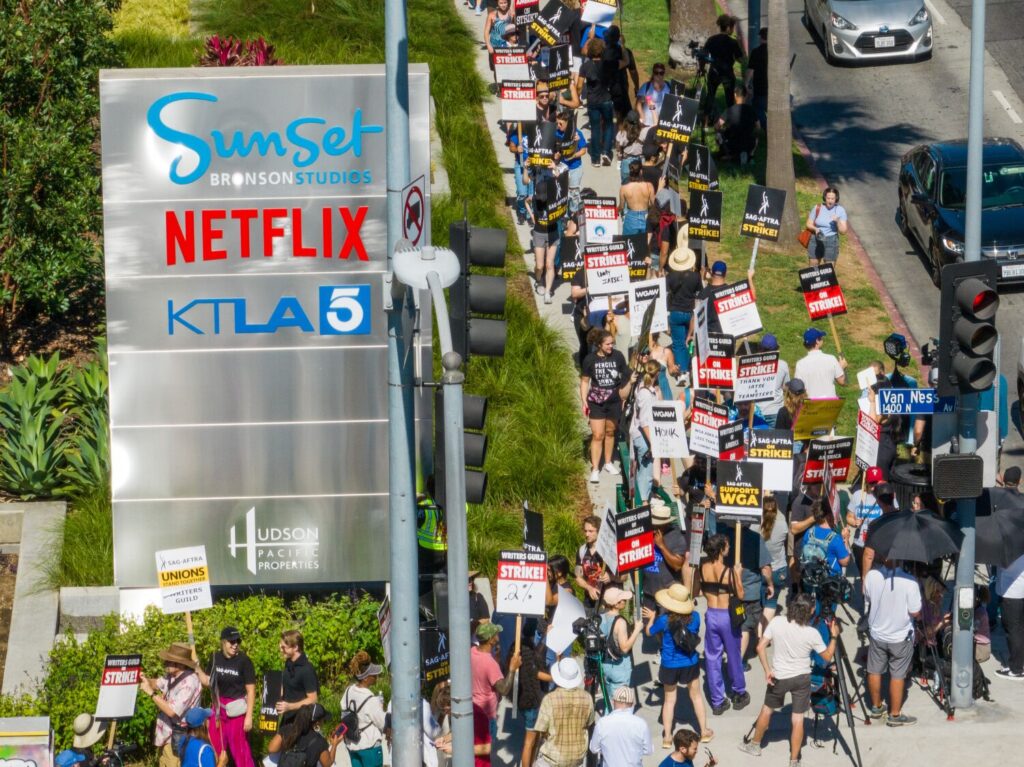Actors have joined writers, who have been on strike since May 2, on the picket lines. SAG-AFTRA, the actors union, and the Alliance of Motion Picture and Television Producers reached an impasse Wednesday in negotiations over a new contract.
The actors are demanding better pay and residuals from streaming services and to address other issues, including the use of artificial intelligence. Studio leaders say actors and writers need to recognize changes in consumer behavior and other economic headwinds the entertainment industry faces.
But what does the work stoppage mean for actors? Will the “Barbie” tour come to a halt, preventing Margot Robbie, who is bringing the doll to life onscreen, from walking the pink carpet?
“You can cover the pink carpet with executives on it, with producers on it, and directors can walk the pink carpet,” said Jonathan Handel, a Los Angeles-based entertainment lawyer.
But actors (and writers) can’t attend promotional events.
That’s just one of SAG-AFTRA’s strike rules, which The Times reviewed to help provide clarity on what actors can and can’t do during the strike.
Handel said if anyone has questions or is unclear about whether they can or can’t work on something, they should contact their SAG-AFTRA representative or email [email protected].
What actors can’t do
Hollywood actors make a living, mainly, by performing in front of a camera, but that’s just the beginning of what they’re unable to do during the strike.
The union specifies that actors cannot act, sing, dance, perform stunts, pilot on-camera aircraft, puppeteer or do performance capture and motion capture work in front of the camera.
That includes work on some projects that are being filmed internationally. Handel said actors can’t work on a film overseas without a SAG-AFTRA agreement or waiver.
“So if you’re shooting in Europe, Australia or New Zealand, starting at 12:01 a.m. [July 14], you have to cease services,” he said.
Aside from on-camera work, actors cannot do off-camera work that includes automated dialogue replacement or looping, or recording additional dialogue or background voices for a film or TV series. Actors also cannot provide services for TV or theatrical trailers, voice acting, narration or stunt coordinating.
Also prohibited: background work (including as a stand-in); photo or body doubles; fittings (including wardrobe tests and makeup tests); rehearsals and camera tests; scanning; or interviews and auditions (including via self-tape).
Press junkets are a staple of the summer blockbuster season — this year, there’s “Barbie,” “Oppenheimer” and the latest “Mission: Impossible” film, to name a few. However, with the strike underway, actors cannot provide publicity services.
The union specifies that this includes tours, personal appearances, interviews, conventions (including Comic-Con), fan expos, festivals, panels, for-your-consideration events, panels, premieres and screenings, award shows, junkets, podcast appearances, social media and studio showcases.
“If an actor wants to go on a podcast to talk about animal cruelty or a political candidate they want, they can do that,” Handel said.
An actor can even create a podcast to talk about the entertainment industry in general. What they can’t do is go onto a podcast to promote a movie.
The strike also prevents actors, their agents or other representatives from having meetings or negotiating on future services, any new agreement, or the creation and use of digital replicas — including through the reuse of prior work.
What actors can do
Other work opportunities for actors include commercials for television, radio and digital media.
Handel explained that the commercial acting contract is not with the studios — it’s with an organization called the Joint Policy Committee, which is controlled by two organizations, the Assn. of National Advertisers and the American Assn. of Advertising Agencies.
On-camera work that is allowed includes television programs covered by the Network TV Code. The covered projects include soap operas, variety shows, talk shows and game shows. (However, late-night variety shows are among the projects shut down by the writers’ strike.)
Actors are allowed to provide services for sound recordings and music videos, as well as take part in an interactive or video game agreement and dubbing and recordings for audiobooks.
Approved work also includes providing services for corporate or educational and nonbroadcast programs, and television and media animation.
Contracts about which actors and their representatives can have meetings include station contracts (and broadcast news), short projects agreements, microbudget agreements, student film agreements, independent new media agreements, independent podcast agreements and micro-monetized podcast agreements, and SAG-AFTRA-approved interim agreements.
“Yes, there’s some acting work to be done,” Handel said.
“But the reality for most actors who are focused on Hollywood is that there isn’t anything for them to do acting-wise.”
About The Times Utility Journalism Team
This article is from The Times’ Utility Journalism Team. Our mission is to be essential to the lives of Southern Californians by publishing information that solves problems, answers questions and helps with decision making. We serve audiences in and around Los Angeles — including current Times subscribers and diverse communities that haven’t historically had their needs met by our coverage.
How can we be useful to you and your community? Email utility (at) latimes.com or one of our journalists: Matt Ballinger, Jon Healey, Ada Tseng, Jessica Roy and Karen Garcia.

